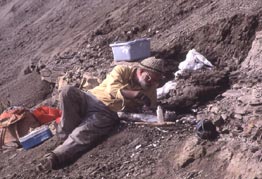|
William A. Clemens Jr., Professor of Integrative
Biology and Curator of the Museum of Paleontology since 1967, officially
retired in December 2002. Bill grew up in Berkeley, got his bachelors’
(1954) and doctoral (1960) degrees here, and apart from a stint teaching
at the University of Kansas from 1961 to 1967, has spent his entire academic
career at Berkeley.
 During this career, Bill has published over a hundred
major papers in paleontology, including a number of monographs on the
mammals of the Late Cretaceous Lance Formation and on early European mammals.
He is one of the premier specialists in the world on Mesozoic mammals,
the origin of mammals, and their diversification and biogeographic spread.
It was on this material that he began his career at Berkeley, and he has
spent most of the rest of it walking and hammering the outcrops of the
Western Interior of the U.S., trying to piece together the earliest events
in mammalian evolution. He has also spent a great deal of time studying
the tooth form and enamel microstructure of early mammals and
During this career, Bill has published over a hundred
major papers in paleontology, including a number of monographs on the
mammals of the Late Cretaceous Lance Formation and on early European mammals.
He is one of the premier specialists in the world on Mesozoic mammals,
the origin of mammals, and their diversification and biogeographic spread.
It was on this material that he began his career at Berkeley, and he has
spent most of the rest of it walking and hammering the outcrops of the
Western Interior of the U.S., trying to piece together the earliest events
in mammalian evolution. He has also spent a great deal of time studying
the tooth form and enamel microstructure of early mammals and

Bill quarrying in the Prince Creek Formation, on the Colville River, North Slope of Alaska, August 1989. (photo courtesy of Mark Goodwin)
|
|
the tantalizing
evidence of molars and jaws that mostly comprise the earliest history
of our forebears.
Dinosaur extinction controversy
Bill is perhaps best
known (or notorious) for his research on the Cretaceous-Tertiary boundary,
and his involvement in the question of the extinction of the dinosaurs.
As everyone knows, the dinosaurs have simply been a lugubrious convenience
of research for Bill. They are the glamorous animals that get all the
attention, while the real scientists go to work on the tiny mammals (aka
important animals) that were underfoot in those days. When the “asteroid
debate” literally exploded at Berkeley at the end of the 1970s, it was
the work of Bill and his students that showed that terrestrial animals
did not become extinct all at once. Rather, according to their evidence from the Western
Interior, the dinosaurs disappeared gradually, and the rest of the fauna didn’t seem to
have been greatly affected at all. However, the asteroid proponents, led by Walter Alvarez
and his team, were disturbed by this news, and Bill and his colleagues in Paleontology
kept up a spirited, but generally good-natured, debate with their counterparts in Geology
through the 1980s and early 1990s. Recently Walter was awarded the prestigious Penrose Award
by the GSA, and Bill simultaneously was given the J.T. Gregory Award and an Honorary Membership
by the SVP. The only way to celebrate these accomplishments jointly (without leaning toward
one hypothesis or the other) was with a whimsical cake depicting the extinction of the
dinosaurs by an overactive, Technicolor volcano (see next page).
Training future paleomammalogists
Bill has trained many of the finest paleomammalian specialists in the world today. A list of
them to date is on page 4. Many of those that he did not train were his

|
